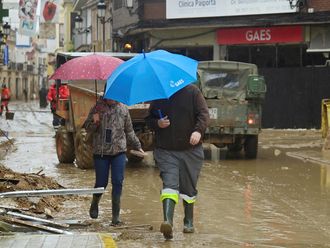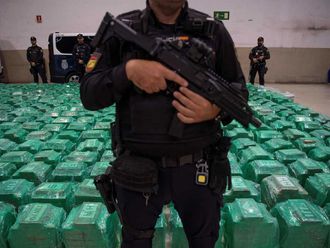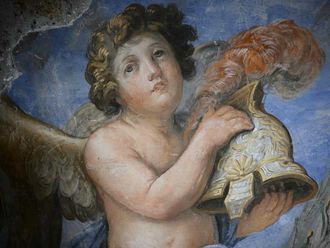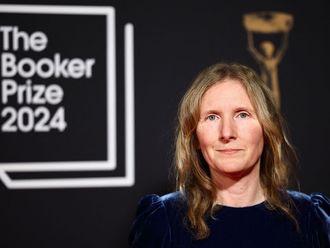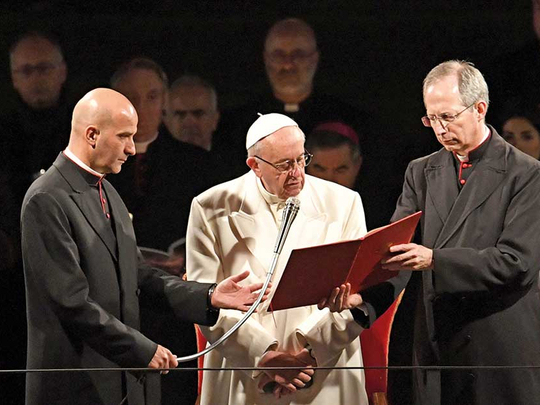
ROME: Thousands of people, including nuns, families with toddlers, and young tourists, endured exceptionally tight antiterrorism checks to pray at the Good Friday procession at the Colosseum, where Pope Francis expressed shame over humanity’s failings.
Francis, wearing a plain white coat, presided over the traditional, evening Way of the Cross procession from a rise overlooking the popular tourist monument as faithful took turns carrying a tall cross and meditations were recited to encourage reflection on Jesus’ suffering and crucifixion.
After the 90-minute-long procession ended, Francis, in a quiet voice, read a prayer he composed that alternated expressing shame for humanity’s failings and hope that “hardened hearts” will become capable of forgiving and loving.
With Easter two days away, Francis said faithful look to Christ “with eyes lowered in shame and with hearts full of hope.”
Such shame, he said, derives from “all those images of devastation, destruction, shipwrecks, that have become routine in our lives.” Hundreds of thousands of migrants have endured hardships at the hands of human traffickers to try to reach Europe, which has increasingly been rejecting them, and thousands of them have perished at sea during the last few years.
Evoking wars and conflicts, as well as attacks on Christian minorities, Francis also voiced shame for “the innocent blood spilled daily of women, children, immigrants, and persons persecuted because of the colour of their skin, or for the ethnic or social group they belong to, and for their faith” in Jesus.
The pontiff also made a reference to clergy’s handling of sex abuse of minors, saying: “shame for all those times that we bishops, priests and other clergy scandalised” the church.
Hours before the evocative, candlelit ceremony, pilgrims underwent the first of two rounds of security checks that started while they still were blocks away from the ancient arena. There was a heavier-than-usual police presence keeping watch on every aspect of the event.
Antiterrorism measures have been heightened for large public crowds after several vehicle attacks in Nice, Berlin and other European cities.
Police opened handbags and backpacks. They checked computers, and, in at least one case, asked an Italian woman to open a package. It turned out to be a tray of pastries, and the woman good-naturedly offered one of the sweets to the officer.
Streets surrounding the Colosseum were closed to traffic, armoured vehicles blocked intersections, bomb-sniffing dogs were used and police checked chemical toilets with scanners for explosives near the Colosseum.
“I believe that we have a situation in which we Europeans have to unite and take the issue of security very seriously,” Jose de Laoz, a businessman from Spain, said while the security sweeps were conducted near the Colosseum.
Terrorism’s repercussions were being felt in Christian communities across the Mediterranean. In Egypt, Coptic churches announced that Easter services would be limited to prayers, without festivities. The measure was taken after twin bombings killed 45 people at churches on Palm Sunday.
In Rome, the Good Friday gathering was calm as participants, estimated by Vatican security to number 20,000, clutched candles in the silence of a warm night. Some parents hoisted children on their shoulders so they could watch. Many people kept their eyes fixed on a towering cross, studded with lit candles glowing against the Colosseum’s ancient stone.
Hours earlier at the Vatican, Francis prostrated himself in prayer during a Good Friday service in St. Peter’s Basilica. The 80-year-old pope lay for several minutes before the central altar.


